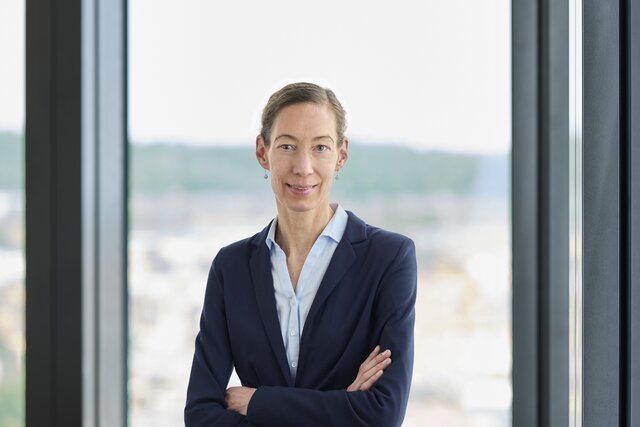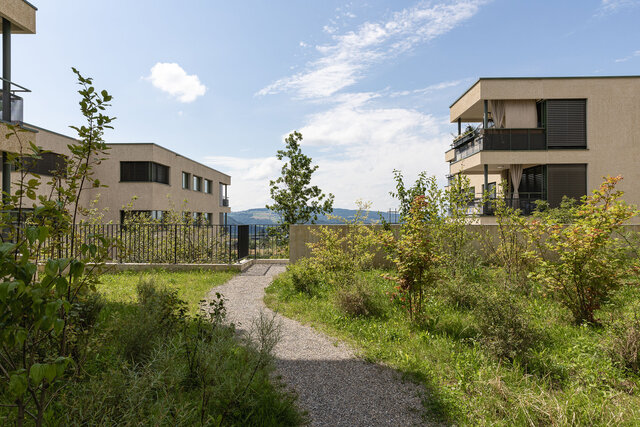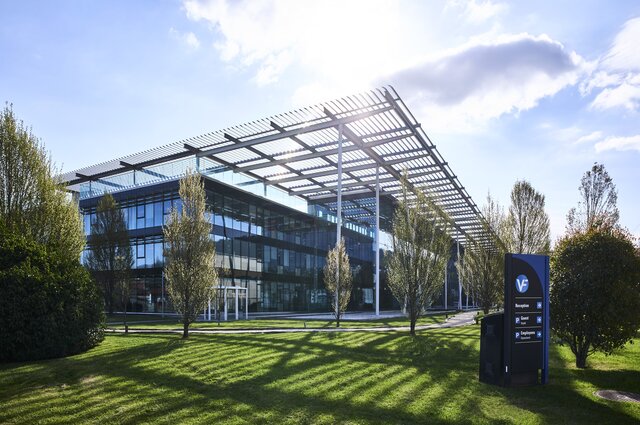
ESG (Environmental, Social, Governance) is no longer just a trend – it is a well-established component of responsible corporate management. Companies such as Swiss Prime Site Solutions (SPSS) play an important role in driving the transition towards a more sustainable real estate industry.
In addition to managing its own two funds (Akara Swiss Diversity Property PK (ADPK) and Swiss Prime Site Solutions Investment Fund Commercial (IFC)) Swiss Prime Site Solutions AG (SPSS) also manages products on behalf of clients. This article focuses on the company’s own funds and its role as a fund manager.
With more than CHF 13 billion in assets under management, SPSS is the largest independent real estate asset manager in Switzerland. This position carries corresponding responsibilities in relation to the environment, society and corporate governance. Regina Hardziewski, Head of Sustainability at SPSS, sums it up: «With clear goals and an integrated ESG strategy, we at SPSS are committed to environmental awareness, social responsibility and responsible corporate governance.» But what exactly does this mean, and how is sustainability embedded throughout a property’s lifecycle?
ESG criteria at SPSS: an integral part of sustainable investment policy
At SPSS, ESG criteria are much more than just a regulatory requirement – they are an integral part of the company’s strategy. The ESG focus can be tailored within the funds to reflect the different levels of decision-making detail. The sustainable investment policy covers the entire real estate investment process – from acquisition and development to operation, renovation and disposal. SPSS thus pursues a holistic approach that integrates environmental, social and governance aspects into the investment process.

«With clear goals and an integrated ESG strategy, we at SPSS are committed to environmental awareness, social responsibility and responsible corporate governance.»
Environmental (E) – the path to net zero by 2050
For the environmental aspect of ESG, SPSS has a clear strategic objective as a fund management company: to ensure responsible use of resources and reduce CO₂ emissions throughout the properties’ entire lifecycle. This strategy relies on a combination of energy-efficient renovations, use of renewable energy and promotion of the circular economy. Fossil-fuel heating systems are gradually being replaced with environmentally friendly alternatives where necessary and feasible, and building shells modernised to reduce energy consumption. The PV potential is assessed for every project, and corresponding systems are then implemented where possible.
With its two funds, SPSS is committed to achieving net-zero carbon emissions by 2050. This ambitious goal aligns with the 1.5-degree target of the Paris Agreement and the net-zero strategy of the Swiss Federal Council. But SPSS is going even further: the fund management company is aiming for a 50% reduction in emissions by 2030 compared with the baseline year. To track and achieve these targets, a CO₂ reduction pathway is developed for each property. For SPSS, sustainability is both a strategic objective and a lived practice that combines environmental responsibility with economic efficiency.
Social (S) – responsibility towards people and communities
Another key pillar of the ESG strategy is social commitment. SPSS is dedicated to enhancing the quality of life and satisfaction of tenants, while taking the interests of local communities into account. Regular tenant surveys, conducted at least every three years, help identify tenant needs and develop specific improvement measures; for example, revised lighting concepts and optimised safety aspects in the properties. Green spaces and communal areas promote social interaction and enhance the well being of residents.
A further key focus is the continuous development of employees. In 2024, Swiss Prime Site organised a full-day workshop on the circular economy in the real estate industry, during which employees from various departments exchanged insights and ideas with experts from business and academia. Such initiatives increase sustainability awareness within the company and actively promote knowledge sharing.
Governance (G) – transparent and responsible corporate management
Strong governance is essential for successful implementation of the ESG strategy. Swiss Prime Site Solutions attaches great importance to clear decision-making processes and transparent reporting. As part of the annual financial reporting for its products, SPSS documents improvements in sustainability performance and describes how the defined goals are to be achieved. Through annual participation in the Global Real Estate Sustainability Benchmark (GRESB), the ESG performance of real estate investment products is assessed against standardised criteria. This regular GRESB participation supports the implementation of defined measures and the continuous optimisation of the portfolios.
Certification plays an important role in the ESG strategy. For development and construction projects, SPSS’s own funds aim where possible to obtain certification according to sustainable building standards, in particular the Swiss Sustainable Building Standard (SNBS). This standard considers a wide range of ESG factors, including resource consumption and health and safety during construction. These measures enable SPSS to comply with legal requirements and also respond to the growing expectations of tenants, investors and society. In addition, SPSS is committed to gradually increasing the share of properties with a sustainability certificate in its portfolio of existing properties. Final DGNB GiB Gold (Buildings in Use) certification has already been obtained for the properties at Wermatswilerstrasse 20 in Fehraltorf and Rudolf-Diesel-Strasse 20-22 in Winterthur. Certificates for further properties are currently in the final review stage.
Sustainability in action: real-world projects
As a fund management company, SPSS consistently implements its ESG strategy through innovative projects. Green lease agreements commit both landlords and tenants to the sustainable use of a property and thus go beyond traditional lease agreements. This joint commitment will be further enhanced in future.
SPSS also takes a holistic approach to sustainability for construction projects in its own funds. For example, key sustainability aspects of the SNBS were taken into account for the «Leo» new-build project in Uitikon, which comprises 98 apartments. Ecological, durable and recyclable building materials were used, and energy is supplied from renewable sources such as photovoltaic systems and heat pumps, supported by efficient building technology. Sustainable mobility is also promoted through convenient access to public transport, bicycle storage space and charging stations for electric vehicles. Spacious green areas enhance biodiversity and add to the quality of life, while the architecture is designed to maximise natural daylight and ensure a comfortable living environment.
At the beginning of 2023, all properties in the ADPK portfolio were assessed to determine whether and to what extent the roofs were suitable for the installation of photovoltaic systems. In addition to the eight existing systems and the four currently under construction, further properties were analysed for PV suitability as part of an assessment by a specialist partner. In 2024, implementation was initiated for five additional photovoltaic systems with an expected production volume of approximately 1.5 million kWh. The first system, at Rütihof 8-12 in Wädenswil, is already complete and applications have been submitted for the remaining four.
In May 2024, an initial agreement was signed with AEW for the installation of electric vehicle charging points. All properties in the ADPK portfolio with more than 10 indoor parking spaces will now be gradually equipped with EV charging stations as needed by tenants. AEW is responsible for the planning, financing and construction, and will also handle the maintenance and tenant billing.
The «Cherpines» development in Plans-les-Ouates (GE), launched in September 2024, is a prime example of how sustainability principles and social responsibility can be successfully combined in a construction project. The project incorporates key ESG (Environmental, Social, Governance) criteria and demonstrates how ecological and social values can be integrated into real estate development. In terms of environmental impact, the development relies on energy-efficient construction that meets the Minergie-P HPE (Haute Performance Énergétique) standard. The commitment to reducing CO2 emissions and promoting renewable energy is further underscored by the use of district heating and the installation of a photovoltaic system with a capacity of 76.5 kWp. This contributes towards a sustainable energy supply and helps to shrink the building’s environmental footprint. The project also serves an important social function: with a «Résidence Senior» consisting of 19 homes and a medical-social establishment (EMS) with 80 rooms, it offers elderly residents a secure living space that combines convenience and care. The project also includes retail space at ground level that provides convenient local shopping for both residents and the surrounding community. This combination promotes social integration and improves quality of life for users.

Sustainability initiatives have also been pursued for the commercial fund IFC. VF Corporation’s property in Stabio (TI) has been awarded the highest distinction, «Platinum», under the LEED New Construction certification programme.
Precise information on the space (e.g. exact calculation of the energy-consuming area) and local consumption data at sensitive points in a property are essential to ensuring that sustainability measures are implemented efficiently and data quality is high. By the end of the financial year (30 September 2024), the entire IFC portfolio had been equipped with smart meters, which enable automated reading of consumption data and allow operations to be systematically optimised. All properties have been included in a framework agreement with major facility management providers in order to continuously improve operation of the properties. This ensures the development of uniform high quality standards with professional optimisation measures across the entire portfolio.

ESG strategy as the foundation for a sustainable future
Swiss Prime Site Solutions demonstrates that a consistent ESG strategy – comprising numerous large and small measures – can have a big impact. Sustainable action contributes towards addressing global challenges and simultaneously creating economic opportunities. With clear goals, measurable metrics and relevant projects, the company shows how sustainable real estate management can be designed today and in the future. «Through consistent implementation of our ESG goals and close collaboration with our stakeholders, we are making a significant contribution to achieving the net-zero target and creating sustainable, high quality living spaces», says Regina Hardziewski.
As a reliable partner for investors and tenants, SPSS is committed to supporting future-proof and sustainable real estate development. Further information and practical examples can be found in the sustainability brochure.
Sustainability brochure (in German)
Green Lease
A green lease is a rental agreement that incorporates sustainability aspects into the use and management of a property. With this type of lease, landlords and tenants both commit to environmentally friendly practices – such as energy-efficient use of space, waste reduction and use of renewable energy. The goal is to jointly minimise the property’s environmental footprint and reduce operating costs.